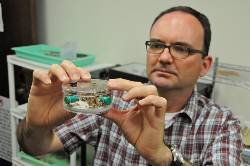The University of Texas at Tyler Biology Professor Receives NSF Grant
March 27, 2017
Popular Searches
March 27, 2017
March 27, 2017
Media Contact: Hannah Buchanan
Editor/Writer–Strategic Communications & Media Relations
Marketing and Communications
The University of Texas at Tyler
903.539.7196 (cell)

Dr. Jon Seal has received a prestigious Faculty Development Early Career Award from the National Science Foundation, Dr. Michael Odell, The University of Texas at Tyler vice president for research and technology transfer, announced.
An assistant professor of biology, Seal studies fungus-growing Leaf-Cutter ants. He joined The University of Texas at Tyler in 2013.
CAREER grants support early-career faculty who have shown potential to serve as academic role models in research and education.
"The Department of Biology is very proud of Dr. Seal's accomplishment. As the department moves to emphasize fundamental and applied research in all areas of biology, awards such as the one received by Dr. Seal are encouraging and signal that the department is moving in a positive direction," said Dr. Srini Kambhampati, Sam A. Lindsey Professor and department chair. "Because the CAREER award includes research and education components, both undergraduate and graduate students, in and out of the classroom, will benefit immensely from this award."
With the five-year $643,077 award, Seal will integrate his research on ant-fungal interactions on campus with the development of biology major and non-major coursework in ecology, animal behavior and symbiotic interactions at the university. In addition, he will train up to eight undergraduate and four graduate biology students in ecological biology and laboratory research methods.
Scientific outreach also will be supported by increased signage at The University of Texas at Tyler Nature Preserve, a ten-acre plot between Harvey Lake and University Blvd., as well as the construction of a live Leaf-Cutter Ant display at the Discovery Science Place, a University of Texas at Tyler center.
"These Leaf-Cutter ants are unique among animals because they grow their own food. In addition to these ants, only humans, a group of termites and beetles are known to exhibit agriculture," Seal said of his research. "What we find in nature is that most of these ants grow a type of fungus related to the edible commercial mushroom. Many of these ants prefer if not require specific strains of these ant-domesticated fungi.
"Our hypothesis is that each ant and fungal species harbors its own bacterial community – many of these bacteria perform important defensive functions and provide nutrients – and that the activity of these bacteria can either allow or prevent the ants from growing different crop species. In a way, the ants have bioengineered their farms," Seal added.
For more information, contact Seal, 903.566.7126 or jseal@uttyler.edu.
One of the 14 campuses of the UT System, The University of Texas at Tyler features excellence in teaching, research, artistic performance and community service. More than 80 undergraduate and graduate degrees are available at The University of Texas at Tyler, which has an enrollment of almost 10,000 high-ability students. The University of Texas at Tyler offers courses at its campuses in Tyler, Longview and Palestine as well as a location in Houston.